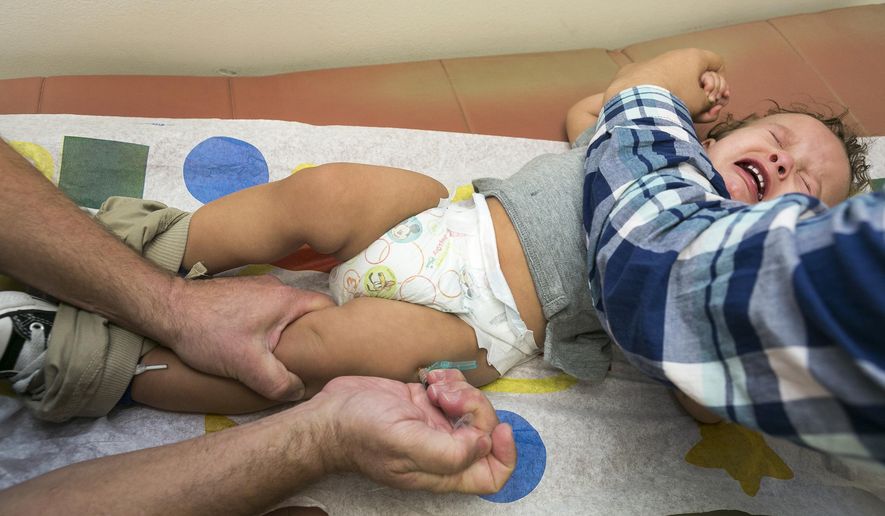More than a third of parents say vaccinating children against measles, mumps and rubella should be a personal choice and not a requirement for school attendance, according to a new Kaiser Family Foundation poll.
It is a marked shift since the onset of the COVID-19 pandemic and the uproar over coronavirus vaccine mandates.
Diseases such as measles are highly contagious, so all U.S. states and the District of Columbia require MMR shots as a prerequisite for attending public school while offering some exemptions.
Now, KFF says 35% of parents of children 18 or younger believe parents should be able to decide whether their kids get the MMR vaccine “even if that may create health risks for other children and adults.”
It is a notable increase from the 23% of parents who responded similarly to a Pew Research Center poll in 2019.
Among all adults, 28% said the shots should be optional, up from 16% in the pre-pandemic Pew poll.
The findings will fuel concerns that COVID-19 vaccine fatigue will spill into other vaccines that, for decades, have been accepted as routine.
Scientists are warning that vaccine hesitancy — an issue that festered long before the coronavirus arrived — has been turbocharged by the pandemic and amplified fringe views about how a range of vaccines are made and whether they should be required in certain instances.
“It is absolutely happening now that people are fighting mandates for all vaccines, most of which are used for children, and most of which is tied to contagiousness in school,” said Arthur Caplan, director of the division of medical ethics at the New York University Grossman School of Medicine. “It is one of the great public health disasters of the past decade that we’re bailing out on mandating childhood vaccination.”
States haven’t scrapped mandates just yet, but public health experts are spooked by the number of bills in Texas and other places that could water down school requirements if they gain traction in legislative sessions. They also point to recent outbreaks that are tied to travel or unvaccinated children.
A measles outbreak swept through parts of Rockland County, New York, in 2019. and Minnesota battled an outbreak earlier this year.
An ongoing outbreak in central Ohio has infected dozens of children and underscores the impact of lagging vaccination for the disease.
Columbus Public Health reports that 72 of the cases were in unvaccinated children while four were in partially vaccinated kids and the remaining case is listed as having “unknown vaccination status.”
“We are in the midst of a measles outbreak in Ohio linked to low vaccination rates, and I think this is it, a harbinger of what may be coming,” said Amesh Adalja, a senior scholar at the Johns Hopkins Center for Health Security. “It is critical that we find some way to repair this breach and restore trust in vaccines, which have incalculable benefits.”
Despite the shift in views on school requirements, 85% of the public and 80% of parents say the benefits of the measles, mumps and rubella vaccines outweigh their risks — hardly changed from 2019 when 88% of the public and 83% of parents responded that way.
Some parents who are leery of the COVID-19 vaccine have told The Washington Times they make a distinction between the coronavirus vaccines, which may stave off severe disease but not all infections, and other vaccines that tend to keep you from getting sick at all.
Parents also frequently say they aren’t opposed to the shots but they don’t like mandates, though some experts say the rules are necessary to ensure uptake.
“We never really got rid of measles or these other things until we got to mandates,” Mr. Caplan said.
KFF said that growing opposition to the measles requirement stems from shifts among people who identify as Republican or lean Republican, with 44% saying parents should be able to opt out — up from 20% in 2019.
The vast majority of Democrats and those who lean Democratic support requiring vaccines for public school students (88%), a slight increase from 2019 (86%).
Among those who have not gotten a COVID-19 vaccine, a big majority (70%) say the benefits of these childhood vaccines outweigh the risks, though 1 in 4 (26%) say the risks outweigh the benefits.
For more information, visit The Washington Times COVID-19 resource page.
• Tom Howell Jr. can be reached at thowell@washingtontimes.com.




Please read our comment policy before commenting.